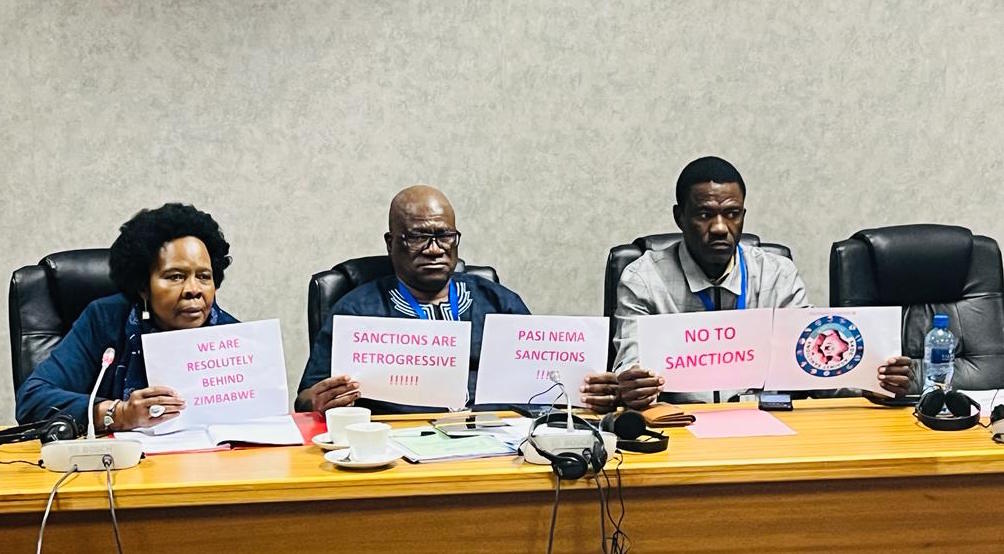|
Getting your Trinity Audio player ready...
|
The Pan-African Parliament (PAP) is among the progressive forces denouncing the illegal sanctions imposed on the Republic of Zimbabwe by some western countries.
The 25th of October is now known as the Southern African Development Community (SADC) Anti-Sanctions Day.
In a speech read on his behalf today by Vice President Constantino Chiwenga, President Mnangagwa paid tribute to SADC, the African Union, and other progressive forces for their unwavering support and solidarity with Zimbabwe’s struggle against the illegal sanctions.
The AU’s legislative organ, PAP, today during the ongoing first session of its sixth Parliament, joined the “Zimbabwe Sanctions Must Go” crusade in Midrand, Johannesburg.
“The Pan African Parliamentarians from the SADC Caucus in Midrand South Africa today, 25 October 2022 joined the call for the immediate removal of sanctions against Zimbabwe and resolved to a motion to that effect in Parliament. MPs from South Africa, Zambia, Eswatini, Mozambique, Namibia, Botswana, Zimbabwe, Lesotho, and Malawi moved a motion to have the illegal sanctions on Zimbabwe removed,” Hon, Tapiwa Mashakada, the legislator for Hatfield told Spiked Online Media.
Meanwhile, the Council for Churches in Africa (CCA) said the church is feeling the impact of rising inflation and incomes that have been eroded with prices skyrocketing daily due to the illegal sanctions.
“The economy is in tatters as a result of illegal sanctions which have been imposed against Zimbabwe by our detractors. The situation has reached another level and ordinary congregants are not free to operate in a country with an economy that is in an intensive care unit.
“Today marks a historic call from the ecumenical umbrella body representing indigenous churches in Africa, as we join everyone in denouncing illegal sanctions which have been imposed against Zimbabwe. Indeed, this is a complementary crusade for the common good of ordinary congregants. We thus congregate today with the main objective to show solidarity with members of society who are wailing in abject poverty caused by illegal sanctions,” CCA said.
Transacting in potential income-generating projects and major investments have been hampered by these restrictions since it requires foreign currency (US$).
There is no ease of doing business since churches are facing the same problems that the general populace is experiencing. That has become a challenge for the church, which rarely receives foreign currency.
Likewise, Africa and many other countries in the region have joined Zimbabwe in the call for the removal of the sanctions which have choked the country for more than two decades thereby retarding development and crippling church-related businesses.
The church argues that sanctions make it more difficult for Western companies and investors to deal with Zimbabwe and make it almost impossible for Zimbabwe to access most of the normal global financial institutions set up to facilitate trade and mobilise capital for development.
Since assuming power, the Second Republic has taken pragmatic steps to re-engage with the world, including hostile western nations. The re-engagement efforts find expression in the united call by SADC member states to speak unanimously against the sanctions annually on October 25.
“Basically, the current administration has implemented political and economic reforms that have been accompanied by unprecedented infrastructural development notwithstanding the continued existence of the illegal sanctions. The European Union introduced sanctions commonly referred to as the Common Foreign Security Policy Framework (CFSP) imposed in February 2002 while the United States enacted the Zimbabwe Democracy and Economic Recovery Act (Zidera), which restricts support to Zimbabwe’s economy.






